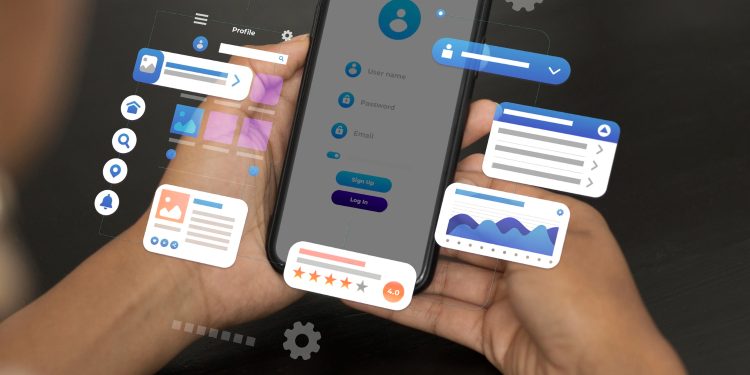Introduction to Mobile App Development:
In today’s digital age, mobile applications have become essential tools for businesses across various industries. Mobile app development refers to the process of creating software applications specifically designed to run on mobile devices, such as smartphones and tablets. These applications serve a wide range of purposes, from providing information and entertainment to facilitating transactions and enhancing communication.
Mobile app development involves a multidisciplinary approach that combines design, programming, testing, and deployment to create user-friendly and functional applications. With the ever-increasing usage of smartphones and the growing demand for on-the-go access to services, businesses in New York are recognizing the importance of having their own mobile apps to stay competitive and meet customer expectations.
In this guide, we’ll explore the significance of mobile apps for businesses in New York, delve into key statistics highlighting the impact of mobile app development, discuss the benefits of investing in mobile apps, outline the mobile app development process, and provide insights into considerations, top companies, pricing, budgeting, and marketing strategies for successful mobile app deployment in the bustling city of New York. Mobile app development in New York is not just a trend but a strategic imperative for businesses looking to thrive in today’s digital economy.
Benefits of Mobile App Development for Businesses in New York:
- Enhanced Customer Engagement: Mobile apps offer businesses in New York a direct channel to engage with their customers in real time. Through features like push notifications, personalized offers, and in-app messaging, businesses can foster deeper connections and build customer loyalty.
- Increased Brand Visibility: Launching a mobile app can significantly boost brand visibility in the competitive New York market. With millions of smartphone users in the city, having a presence on mobile devices ensures that businesses remain top-of-mind among their target audience.
- Improved Customer Experience: Mobile apps enable businesses to provide a seamless and convenient user experience, allowing customers to access products or services anytime, anywhere. By offering features like easy navigation, one-click purchasing, and personalized recommendations, businesses can enhance customer satisfaction and retention.
- Data-driven Insights: Mobile apps provide valuable data on user behavior, preferences, and demographics, enabling businesses to make informed decisions and tailor their marketing strategies accordingly. By analyzing app analytics, businesses can optimize performance, identify trends, and drive growth.
- Competitive Advantage: In a city as dynamic and competitive as New York, having a mobile app can set businesses apart from their competitors. A well-designed and feature-rich app demonstrates innovation, forward-thinking, and a commitment to meeting customer needs, giving businesses a competitive edge in the market.
Mobile App Development Process:
- Define Objectives: Start by defining the goals and objectives of the mobile app. Determine its purpose, target audience, and desired features to align with business objectives.
- Research and Planning: Conduct market research to understand user needs, competitor offerings, and industry trends. Develop a comprehensive plan outlining the app’s functionality, design requirements, and development timeline.
- Design: Create wireframes and prototypes to visualize the app’s user interface and user experience. Focus on intuitive navigation, appealing aesthetics, and seamless interactions to ensure a positive user experience.
- Development: Build the app using appropriate technologies and programming languages. Implement features, integrate APIs, and perform thorough testing to ensure functionality, performance, and security.
- Testing and Quality Assurance: Conduct rigorous testing to identify and fix any bugs or issues. Perform usability testing, compatibility testing, and security testing to ensure the app meets quality standards.
- Deployment: Prepare the app for launch by submitting it to the app stores (Apple App Store and Google Play Store). Follow the submission guidelines and requirements of each platform for a successful deployment.
- Post-launch Support: Continuously monitor the app’s performance, gather user feedback, and make updates or enhancements as needed. Provide ongoing support and maintenance to ensure optimal functionality and user satisfaction.
Key Considerations for Mobile App Development in New York:
- Local Regulations and Compliance: Be aware of local regulations and compliance requirements specific to New York, such as data protection laws and consumer rights, to ensure legal and ethical app development practices.
- User Preferences and Trends: Stay informed about the preferences and trends of New York’s diverse population. Consider cultural nuances, language preferences, and lifestyle habits to tailor the app to the local market.
- Network Connectivity: New York’s urban landscape presents unique challenges related to network connectivity and bandwidth. Optimize the app for reliable performance in areas with varying network conditions, such as subway stations and crowded urban areas.
- Security and Privacy: Prioritize security and privacy measures to protect user data and sensitive information. Implement encryption, secure authentication, and data protection protocols to safeguard against cyber threats and breaches.
- Integration with Local Services: Explore opportunities to integrate the app with local services and amenities available in New York, such as public transportation, dining options, and entertainment venues, to enhance user experience and utility.
Mobile App Development Pricing and Budgeting:
- Define Project Scope: Begin by defining the scope of your mobile app project, including features, functionality, and platform compatibility. The complexity of your app will influence development costs.
- Research Development Costs: Research average development costs for similar apps in your industry and market. Factors such as platform (iOS, Android, or both), app complexity, design requirements, and development timeframes will impact pricing.
- Get Multiple Quotes: Obtain quotes from multiple mobile app development companies or freelancers to compare pricing and services. Look for providers with experience in your industry and a proven track record of delivering quality apps within budget.
- Consider Maintenance and Updates: Factor in ongoing maintenance, updates, and support costs for your app post-launch. This may include bug fixes, feature enhancements, platform updates, and security patches.
- Allocate for Marketing and Promotion: Set aside a portion of your budget for marketing and promotion activities to ensure your app gains visibility and attracts users after launch. Effective marketing strategies can drive app downloads and user engagement.
- Budget Contingency: Include a contingency fund in your budget to account for unforeseen expenses or changes in project scope. It’s common for app development projects to encounter unexpected challenges or additional requirements along the way.
- Balance Features and Budget: Prioritize essential features and functionalities for your app within your budget constraints. Consider a phased development or MVP (Minimum Viable Product) approach to launch a basic version of your app initially and add more features over time as the budget allows.
Mobile App Marketing and Promotion Strategies:
- App Store Optimization (ASO): Optimize your app’s listing on the Apple App Store and Google Play Store with relevant keywords, compelling descriptions, high-quality visuals, and positive reviews to improve visibility and ranking in search results.
- Social Media Marketing: Leverage social media platforms such as Facebook, Instagram, Twitter, and LinkedIn to promote your app and engage with your target audience. Create engaging content, run targeted ads, and encourage user-generated content to increase awareness and drive downloads.
- Influencer Marketing: Collaborate with influencers or bloggers in your industry to promote your app to their followers. Influencer endorsements can help increase credibility, reach new audiences, and drive app downloads.
- Content Marketing: Create valuable and informative content related to your app’s niche or industry. Publish blog posts, articles, videos, and tutorials to educate and engage your audience, establish thought leadership, and drive organic traffic to your app.
- App Launch Campaign: Plan a dedicated app launch campaign to generate buzz and excitement around your app’s release. Use teaser videos, countdowns, press releases, and email marketing to build anticipation and encourage pre-registration or pre-orders.
- User Referral Program: Implement a user referral program within your app to incentivize existing users to refer their friends and family. Offer rewards, discounts, or exclusive access to premium features in exchange for referrals, helping to drive user acquisition and retention.
- Paid Advertising: Invest in paid advertising channels such as Google Ads, Facebook Ads, and mobile ad networks to reach a targeted audience and drive app installs. Experiment with different ad formats, targeting options, and creatives to optimize performance and maximize ROI.
- Engage with App Communities: Participate in relevant online communities, forums, and discussion groups related to your app’s niche or industry. Engage with potential users, answer questions, and solicit feedback to build relationships and generate interest in your app.
Conclusion:
In the bustling metropolis of New York, mobile app development has evolved from being a mere convenience to an absolute necessity for businesses striving to thrive in the competitive landscape. The dynamic nature of the city, coupled with its tech-savvy population and diverse market opportunities, makes mobile apps a powerful tool for businesses looking to expand their reach, enhance customer engagement, and drive revenue growth.
Mobile apps offer numerous benefits for businesses in New York, including enhanced customer engagement, increased brand visibility, improved customer experience, and access to valuable data insights. By providing a seamless and convenient way for customers to interact with their products or services, businesses can gain a competitive edge and stay ahead of the curve in the digital age.
Furthermore, the mobile app development process, while requiring careful planning and execution, offers businesses the opportunity to tailor their apps to meet the unique needs and preferences of the New York market. By considering factors such as local regulations, network connectivity, and user preferences, businesses can create innovative and impactful apps that resonate with their target audience and drive success.
In conclusion, mobile app development is not just a trend but a strategic imperative for businesses in New York looking to thrive in today’s digital economy. By embracing mobile technology, businesses can unlock new opportunities, strengthen their competitive position, and position themselves for long-term success in the vibrant and dynamic landscape of New York City.










